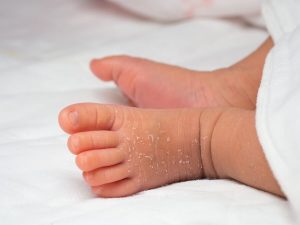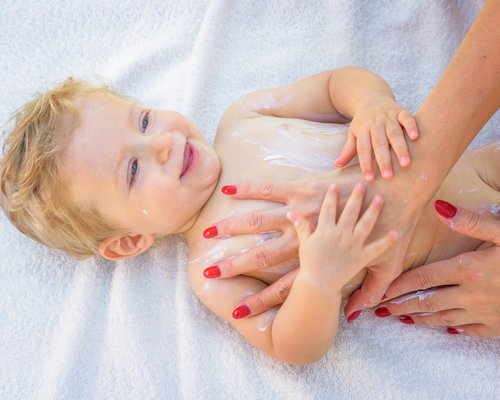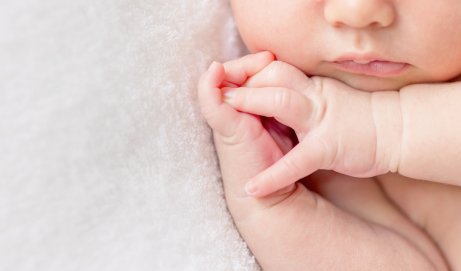How to Care for Your Newborn's Skin

The skin of newborn babies is extremely delicate and sensitive during the first days of life. After 9 months of living within the womb, surrounded by amniotic fluid, newborns find themselves in a completely new habitat. Now, your newborn’s skin mustn’t only adapt to new conditions, but also other external factors.
For example, newborns must battle with factors such as exposure to the chemicals in hygiene products and laundry soap. They must also get used to wearing diapers, and their skin rubbing up against clothing. This is why many first-time parents wonder just how to best care for and protect their baby’s skin.
Fortunately, the simple advice in today’s article will help you provide proper care in regards to hygiene and moisturization. By applying these tips, you’ll reduce the occurrence of peeling and skin dehydration, which are so common in newborns.
How to care for your newborn’s skin
Newborn babies have tremendously delicate skin that has yet to adapt to life outside the womb. It’s important the parents accompany this process.
Throughout gestation, your baby lives in a dark, watery environment, free of external irritants.
While in the womb, there is a waxy substance called vernix caseosa that protects the fetus from infection. Suddenly, at birth, newborns are exposed to different materials and substances, and lose the environment they’re used to.
So, to care for your newborn’s skin during this period, there are four factors to keep in mind:
- First, avoid prolonged contact between your baby and wet or soiled diapers.
- Second, only use soaps that are dermatologically designed for babies.
- Third, choose clothing items that are gentle on your newborn’s skin and, lastly, hydrate your baby’s skin twice a day. We’ll go into more detail below.

Frequent diaper changes
It’s important that parents check their newborn’s diaper frequently and change dirty diapers as soon as possible. This reduces the contact between your little one’s skin with urine and feces. Otherwise, both of these substances can cause painful irritation.
We also recommend using extra absorbent diapers, as well as wipes that are soap and chemical-free. Apply creams or ointments designed to prevent diaper rash.
Bathtime
During the first days of a baby’s life, you should avoid the use of soaps, if possible. Rather, gently wash your newborn’s skin with just water, and completely avoid scrubbing.
If you do use skin cleaning products, choose those that have a pH of 4. These are non-abrasive to your little one’s skin. Just the same, only use small amounts.
At the same time, you shouldn’t bathe your newborn baby more than twice a week. Furthermore, baths should be very short.
It’s also important to be very careful with your baby’s belly button. In fact, you should put off bathing altogether until the cord has fallen off. After bath time, pat your baby dry with a soft towel and don’t rub.
Clothing recommendations to care for your newborn’s skin
Newborn babies should only use clothing made of 100% cotton. Some fabrics and fibers may feel soft to the touch, but still cause irritation.
Therefore, don’t let appearances fool you. When choosing clothes, make protecting your little one’s skin a priority.
Don’t judge fabrics by how soft they feel. Rather, try to avoid items that can cause allergies or skin irritations. Your little one’s skin isn’t ready to be in contact with certain synthetic fibers and dyes.
Of course, it’s also important to be careful about what laundry detergent you use to wash your baby’s clothes.
You should use products that are specifically designed for babies under the age of 6 months. Use them to wash both your little one’s clothing as well as his or her towels, blankets and sheets. It’s best to avoid using fabric softener.

“During the first days of a baby’s life, you should avoid the use of soaps, if possible. Rather, gently wash your baby’s skin with just water, and completely avoid scrubbing.”
Hydrate your baby’s skin
The skin of newborn babies is very prone to dehydration and flaking. This is a natural process and, in theory, shouldn’t be cause for worry.
However, it’s still a good idea to use specific lotions to help keep your newborn’s skin hydrated. This will help keep your child from experiencing any discomfort.
We recommend applying moisturizing cream twice a day. Be sure that whatever lotion you choose is emollient and designed for babies.
As a final recommendation, remember to talk with your pediatrician about the best lotions for your little one. And, of course, make sure to take your little one in if you notice any irregularities in his or her skin.
The skin of newborn babies is extremely delicate and sensitive during the first days of life. After 9 months of living within the womb, surrounded by amniotic fluid, newborns find themselves in a completely new habitat. Now, your newborn’s skin mustn’t only adapt to new conditions, but also other external factors.
For example, newborns must battle with factors such as exposure to the chemicals in hygiene products and laundry soap. They must also get used to wearing diapers, and their skin rubbing up against clothing. This is why many first-time parents wonder just how to best care for and protect their baby’s skin.
Fortunately, the simple advice in today’s article will help you provide proper care in regards to hygiene and moisturization. By applying these tips, you’ll reduce the occurrence of peeling and skin dehydration, which are so common in newborns.
How to care for your newborn’s skin
Newborn babies have tremendously delicate skin that has yet to adapt to life outside the womb. It’s important the parents accompany this process.
Throughout gestation, your baby lives in a dark, watery environment, free of external irritants.
While in the womb, there is a waxy substance called vernix caseosa that protects the fetus from infection. Suddenly, at birth, newborns are exposed to different materials and substances, and lose the environment they’re used to.
So, to care for your newborn’s skin during this period, there are four factors to keep in mind:
- First, avoid prolonged contact between your baby and wet or soiled diapers.
- Second, only use soaps that are dermatologically designed for babies.
- Third, choose clothing items that are gentle on your newborn’s skin and, lastly, hydrate your baby’s skin twice a day. We’ll go into more detail below.

Frequent diaper changes
It’s important that parents check their newborn’s diaper frequently and change dirty diapers as soon as possible. This reduces the contact between your little one’s skin with urine and feces. Otherwise, both of these substances can cause painful irritation.
We also recommend using extra absorbent diapers, as well as wipes that are soap and chemical-free. Apply creams or ointments designed to prevent diaper rash.
Bathtime
During the first days of a baby’s life, you should avoid the use of soaps, if possible. Rather, gently wash your newborn’s skin with just water, and completely avoid scrubbing.
If you do use skin cleaning products, choose those that have a pH of 4. These are non-abrasive to your little one’s skin. Just the same, only use small amounts.
At the same time, you shouldn’t bathe your newborn baby more than twice a week. Furthermore, baths should be very short.
It’s also important to be very careful with your baby’s belly button. In fact, you should put off bathing altogether until the cord has fallen off. After bath time, pat your baby dry with a soft towel and don’t rub.
Clothing recommendations to care for your newborn’s skin
Newborn babies should only use clothing made of 100% cotton. Some fabrics and fibers may feel soft to the touch, but still cause irritation.
Therefore, don’t let appearances fool you. When choosing clothes, make protecting your little one’s skin a priority.
Don’t judge fabrics by how soft they feel. Rather, try to avoid items that can cause allergies or skin irritations. Your little one’s skin isn’t ready to be in contact with certain synthetic fibers and dyes.
Of course, it’s also important to be careful about what laundry detergent you use to wash your baby’s clothes.
You should use products that are specifically designed for babies under the age of 6 months. Use them to wash both your little one’s clothing as well as his or her towels, blankets and sheets. It’s best to avoid using fabric softener.

“During the first days of a baby’s life, you should avoid the use of soaps, if possible. Rather, gently wash your baby’s skin with just water, and completely avoid scrubbing.”
Hydrate your baby’s skin
The skin of newborn babies is very prone to dehydration and flaking. This is a natural process and, in theory, shouldn’t be cause for worry.
However, it’s still a good idea to use specific lotions to help keep your newborn’s skin hydrated. This will help keep your child from experiencing any discomfort.
We recommend applying moisturizing cream twice a day. Be sure that whatever lotion you choose is emollient and designed for babies.
As a final recommendation, remember to talk with your pediatrician about the best lotions for your little one. And, of course, make sure to take your little one in if you notice any irregularities in his or her skin.
This text is provided for informational purposes only and does not replace consultation with a professional. If in doubt, consult your specialist.








